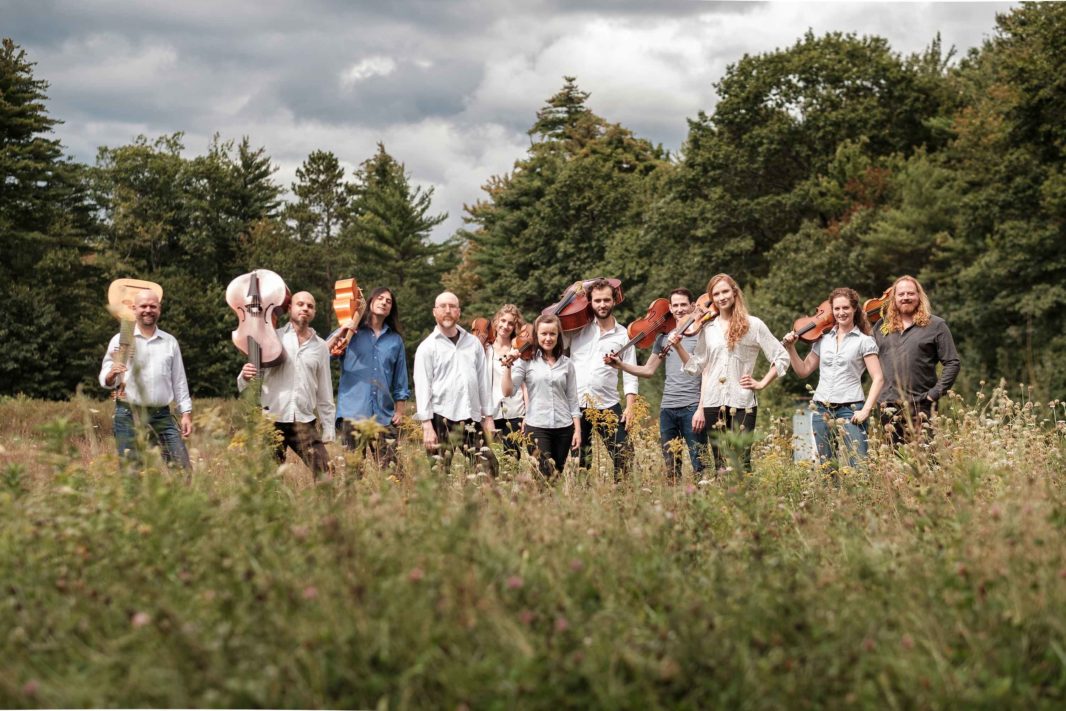Beth Wenstrom is a very modern gal, who happens to make a living playing very old music. When she’s around, notes from ages past collide with today’s sensibilities, and, man, does it sound good.
Wenstrom is a violinist with Acronym, the 12-member Baroque ensemble founded in 2012 by Kivie Cahn-Lipman. Technically speaking, Acronym is a typical early music ensemble, featuring instruments including viola da gamba, violin, and the “continuo” theorpo (similar to a large lute), harpsichord, cello and bass.
And, like all of Acronym’s members, Wenstrom is a Baroque specialist.“The period instruments, the sonority of the gut strings, the use of bowing to interpret the intention of the music, the way we match the verbal articulation with our bowing,” she says, “make for a fascinating puzzle.”
So, this is classical music, to be sure, but it is classical music that rocks. Acronym is — you guessed it — an acronym, standing for Anachronistic Cooperative Realizing Obscure Nuanced Yesteryear’s Masterpieces. The musicians are dedicated to giving modern premieres of the “wild instrumental music of 17th century.”
In the case of the New York-based, self-dubbed ’band’s’ — that’s right, no chamber orchestra here — upcoming Feb. 10 performance at Boston’s Isabella Stewart Gardner Museum, we can add opera to its repertoire. Wenstrom and team have been invited by George Steel, the Gardner Museum’s innovative Abrams Curator of Music, to perform a concert version and the local premiere of Alessandro Scarlatti’s 1697 “La Caduta de’Decemviri” opera in its original Italian.
For this production, Acronym, along with Steel, has engaged some of the opera scene’s most sought after singers. They bring significant acting chops to their musical skills and their pedigree includes leading roles for the Metropolitan Opera, Boston Symphony, New York Philharmonic, Chicago Lyric Opera and companies around the world.
Scarlatti was a prolific composer, but performances of his operas are extremely rare. “La Caduta” has never been recorded, so the Gardner concert is going to be one of a kind, and, for early music fans, one not to miss.
Wenstrom leads the group for “La Caduta,” since Acronym performs without a conductor. Different ensemble members take the lead on other projects. While this style would not work for a larger, major orchestra, for Acronym, it does.
Elliot Figg, Acronym’s harpsichord and organ player, says, “We try to get our hands on material no one has heard in 300 years, and then see what we can make of it.”

Credit: Jeff Weeks
Baroque band Acronym puts on Scarlatti’s “La Caduta de’Decemviri” Feb. 10 at the Isabella Stewart Gardner Museum.
Figg loves the improvisational elements of early music, which might not be the first thing one thinks of when discussing this genre, but it’s a major element of the work.
The continuo, the collective bass line, has a notated structure in outline form only, and the continuo players improvise upon that structure. The quartet of instruments that make up the continuo act as the glue of the music, ’continuing’ their playing through the ensemble sections, the arias and as the only instrumental accompaniment during the recitatives (the semi-sung, semi-spoken sections that propel the story forward). The improvisational element, rare in classical music, makes the personnel themselves, inventing the actual notes they play, vital to the overall interpretation. This is one of the areas where Acronym’s years-long collaboration shines through, creating musical opportunities, not unlike jazz, that inspires a unique, driving sound.
Like many narratives of the opera cannon, the story of “La Caduta” is built around events that don’t fit into any acceptable contemporary feminist standard. Nevertheless, Virginia, our main female character, is known to history as a hero of Roman republicanism.
Wenstrom grapples with the story’s gender politics. “It’s difficult, as a woman, to inhabit this type of story,” she says. “But, the narrative is part of history, musically, theatrically and politically.”
In this case, Acronym offers a historically accurate version of a historically accurate story, and allows the audience to make sense of gender politics then and now.
Here’s a quick synopsis: A bunch of tyrannical and corrupt patrician politicians (the de’Decemviri) have decided to stay in power, illegally, because they are at the end of their term limit (as Rome is a republic). Head bad guy Appio Claudio has his eye on Virginia (a plebeian daughter of a famous centurion), even though she’s already engaged. Abduction ensues. The plebeians have had enough of the de’Decemviri’s bad behavior, and force the issue. A court case follows, and the good guys lose (meaning Appio Claudio gets the girl). Spoiler alert: In order that Virginia retains her liberty and honor, her father (like the good republican he is) kills her. Except in this opera, librettist Silvio Stampiglia decided to have a happy ending, so while Virginia does get stabbed, she also lives, telling Papa that if he tries to kill her again, she will do a better job of dying. Along the way, the republicans retake control.
Clearly, this is not a comedy, but Stampiglia is known for intermingling serious and comic elements. Like Wenstrom herself, Acronym takes its attention to historical detail seriously, while infusing a contemporary virtuosic enthusiasm into the performance.
And, it makes for great story-telling.
La Caduta de’Decemviri
Feb. 10, 1:30 p.m.
$15-$36
Isabella Stewart Gardner Museum, 25 Evans Way, Boston



 4 min read
4 min read





